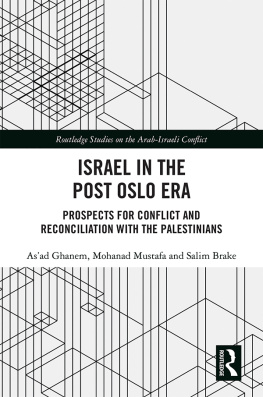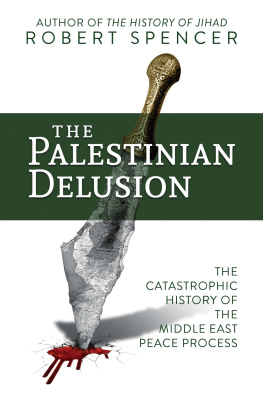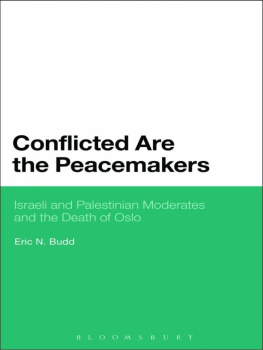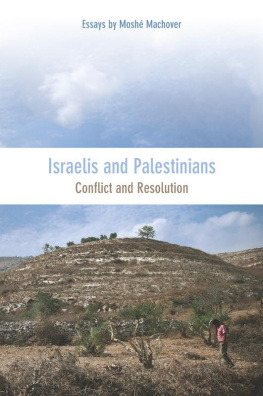Israel in the Post Oslo Era
Israel in the Post Oslo Era examines the official Israeli stands and policies towards the Palestinian problem from the beginning of the twenty-first century. The book argues that Israel is gradually withdrawing from the commitment of a two-state solution and from the general framework of the peace process that started in 1993 with the signing of the Oslo accord.
The main factor behind Israels shift regarding the conflict and its resolution is related to the steady and gradual rise of the Israeli right since the 2009 general elections, to reach the dominant block status. These fundamental changes are the result of profound social transformations, such as the functional significance of marginal groups. The unprecedented growth of the right disputes basic questions, addressed in this book, including the official Israeli approach towards the Palestinian problem in general, particularly the two-state solution.
The book examines these developments and the overall Israeli withdrawal from the peace process and its commitment to a two-state solution. Israel in the Post Oslo Era is an invaluable resource for students and researchers interested in Arab-Israeli conflict resolutions, Middle East and Israeli Politics.
Asad Ghanem (PhD) is a leading academic and intellectual among the Palestinians in Israel, currently a lecturer at the School of Political Science, University of Haifa. His theoretical work has explored the legal, institutional and political conditions in ethnic states and conflict studies. He published 14 books and numerous articles about ethnic politics in divided societies, including about ethnic divisions and Arab-Jewish relations in Israel.
Mohanad Mustafa (PhD) is a senior lecturer at the Beit Berl College, and lectures in the MA Middle East Politics program at the School of Political Science, University of Haifa. He specializes in Arab politics in Israel, political Islam, Arab Regimes, Democratization and politics in Palestine and Israel. He has published various articles in referred journals regarding these issues.
Salim Brake is a PhD candidate at the University of Haifa. Currently, he is a lecturer at the Open University in Israel and Emek Yizrael College. His thesis focuses on the Parliamentarianism and political professionalization and representation. Other research interests are local councils, elections and political representation, and the political participation and behavior in Israel and the Druzes in the Middle East.
Routledge Studies on the Arab-Israeli Conflict
Series Editor: Mick Dumper, University of Exeter
The Arab-Israeli conflict continues to be the center of academic and popular attention. This series brings together the best of the cutting edge work now being undertaken by predominantly new and young scholars. Although largely falling within the field of political science, the series also includes interdisciplinary and multidisciplinary contributions.
21 Palestinians in Jerusalem and Jaffa, 1948
A Tale of Two Cities
Itamar Radai
22 Palestinian Political Discourse
Between Exile and Occupation
Emile Badarin
23 Islamic Development in Palestine
A Comparative Study
Stephen Royle
24 The History and Politics of the Bedouin
Reimagining Nomadism in Modern Palestine
Seraj Assi
25 Palestinian Popular Struggle
Unarmed and Participatory
Michael J. Carpenter
26 Isreal in the Post Oslo Era
Prospects for Conflict and Reconciliation with the Palestinians
Asad Ghanem, Mohanad Mustafa and Salim Brake
For more information about this series, please visit: http://www.routledge.com/middleeaststudies/series/SEAIC
First published 2019
by Routledge
2 Park Square, Milton Park, Abingdon, Oxon OX14 4RN
and by Routledge
52 Vanderbilt Avenue, New York, NY 10017
Routledge is an imprint of the Taylor & Francis Group, an informa business
2019 Asad Ghanem, Mohanad Mustafa, Salim Brake
The right of Asad Ghanem, Mohanad Mustafa, Salim Brake to be identified as authors of this work has been asserted by them in accordance with sections 77 and 78 of the Copyright, Designs and Patents Act 1988.
All rights reserved. No part of this book may be reprinted or reproduced or utilised in any form or by any electronic, mechanical, or other means, now known or hereafter invented, including photocopying and recording, or in any information storage or retrieval system, without permission in writing from the publishers.
Trademark notice: Product or corporate names may be trademarks or registered trademarks, and are used only for identification and explanation without intent to infringe.
British Library Cataloguing-in-Publication Data
A catalogue record for this book is available from the British Library
Library of Congress Cataloging-in-Publication Data
Names: Ghanem, Asad, author. | Mustafa, Mohanad, author. | Brake, Salim, author.
Title: Israel in the post Oslo era: prospects for conflict and reconciliation with the Palestinians / Asad Ghanem, Mohanad Mustafa, Salim Brake.
Description: Milton Park, Abingdon, Oxon; New York, NY: Routledge, 2019. |
Series: Routledge studies on the Arab-Israeli conflict; 26 | Includes bibliographical references and index.
Identifiers: LCCN 2018038469 (print) | LCCN 2018043925 (ebook) | ISBN 9780429426926 (master) | ISBN 9780429762444
(Adobe Reader) | ISBN 9780429762437 (Epub) |
ISBN 9780429762420 (Mobipocket) | ISBN 9781138386181 |
ISBN 9781138386181(hardback) | ISBN 9780429426926(ebook) Subjects: LCSH: Arab-Israeli conflict1993 | Arab-Israeli conflict1993Peace. | Palestinian ArabsPolitics and government1993 | IsraelPolitics and government1993Classification: LCC DS119.76 (ebook) | LCC DS119.76 .G365 2019
(print) | DDC 956.9405/5dc23
LC record available at https://lccn.loc.gov/2018038469
ISBN: 978-1-138-38618-1 (hbk)
ISBN: 978-0-429-42692-6 (ebk)
Typeset in Times New Roman
by codeMantra
This book is the product of years of complex collaborative effort. It began by our exchanging views on the rise of the new post-Oslo Israeli policy towards the solution of the Palestinian problem and on the implications of the rise of the new Israeli right. Over a long period, we have been following the political changes in Israel and their significance, both as part of our academic and research activity and as concerned participants in the public debate. We have followed the published materials and literature and tried to understand and explain the implications of these changes.
Three political events have taken place in the post-Oslo period, marking the direction Israel is taking. First, the 1996 election victory of the right-wing representation, Benjamin Netanyahu, over Shimon Peres, the architect of the Oslo Accords, marked the beginning of the post-peace-treaty phase between Israel and the Palestine. The second event was the rise of Ariel Sharon and his attempts to eliminate the Palestinian problem by means of open diplomatic and actual war against the Palestinian Authority and the Palestinian leader, Yasser Arafat. The third event was the re-emergence of Benjamin Netanyahu and his right-wing coalition in 2009.










